2023届高考英语重要语法虚拟语气课件(120张)
文档属性
| 名称 | 2023届高考英语重要语法虚拟语气课件(120张) | 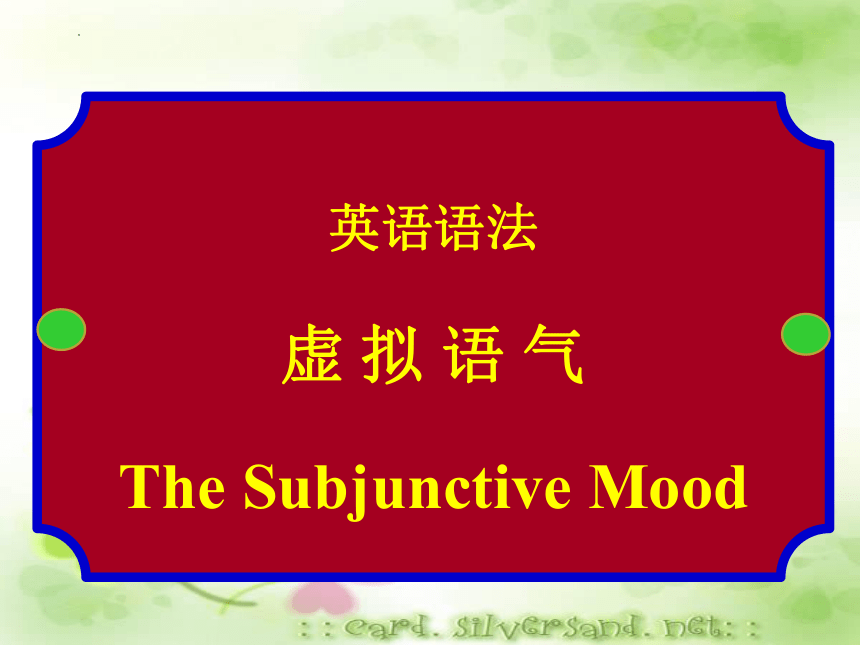 | |
| 格式 | zip | ||
| 文件大小 | 533.0KB | ||
| 资源类型 | 教案 | ||
| 版本资源 | 通用版 | ||
| 科目 | 英语 | ||
| 更新时间 | 2022-07-27 22:29:13 | ||
图片预览

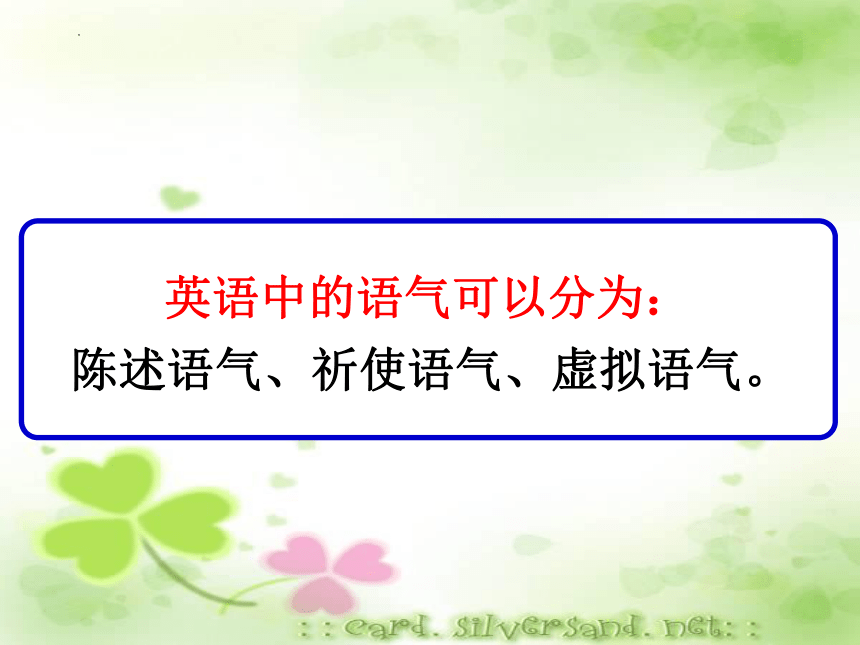
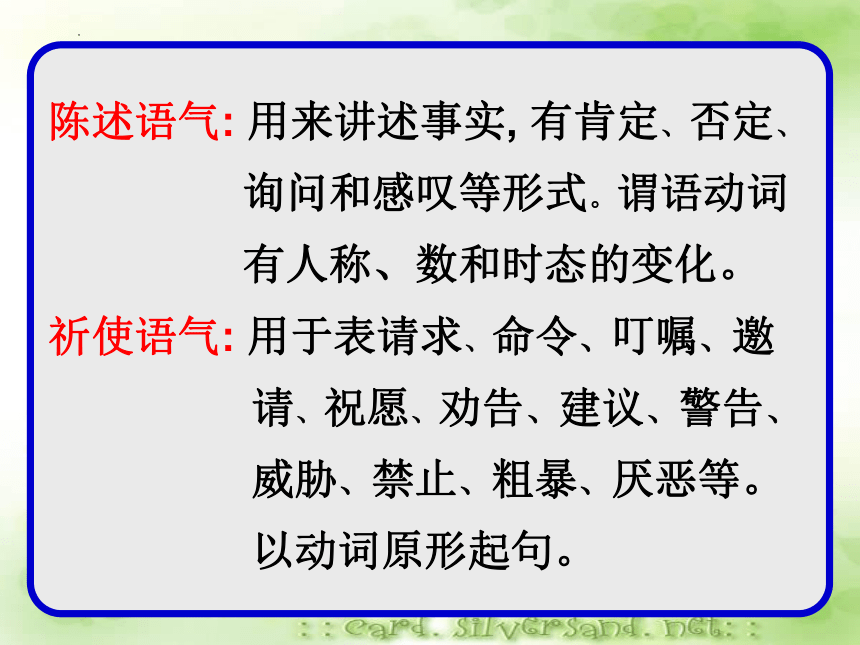

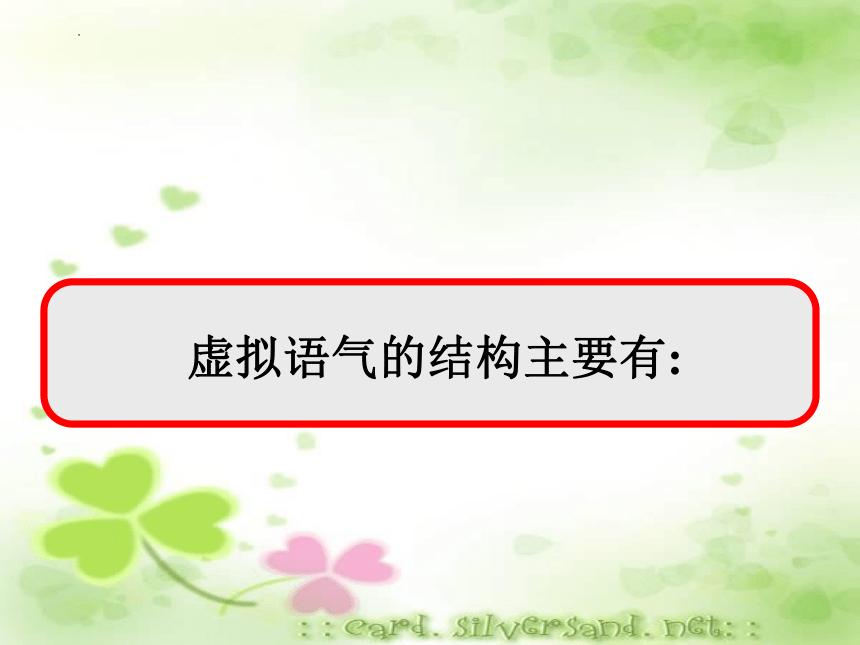
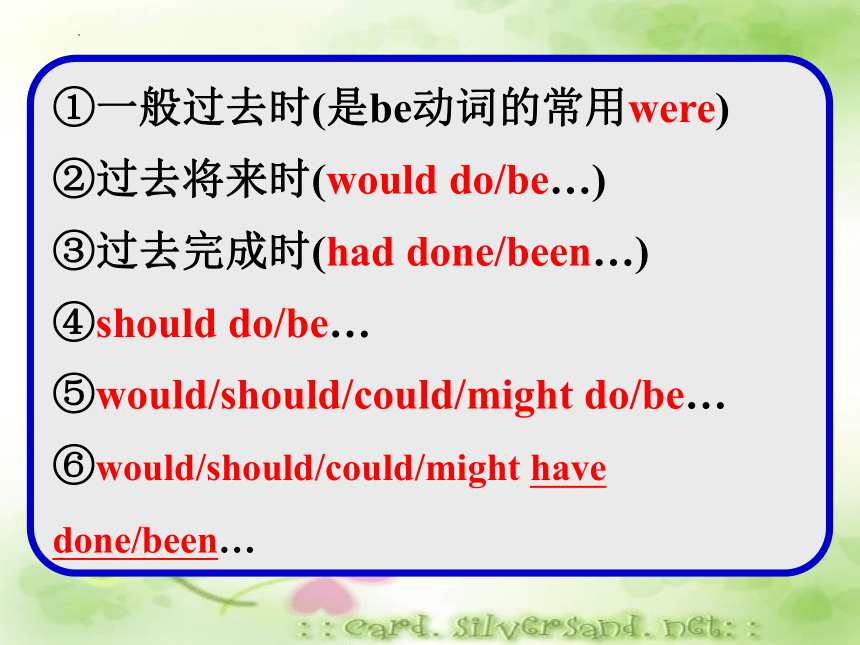
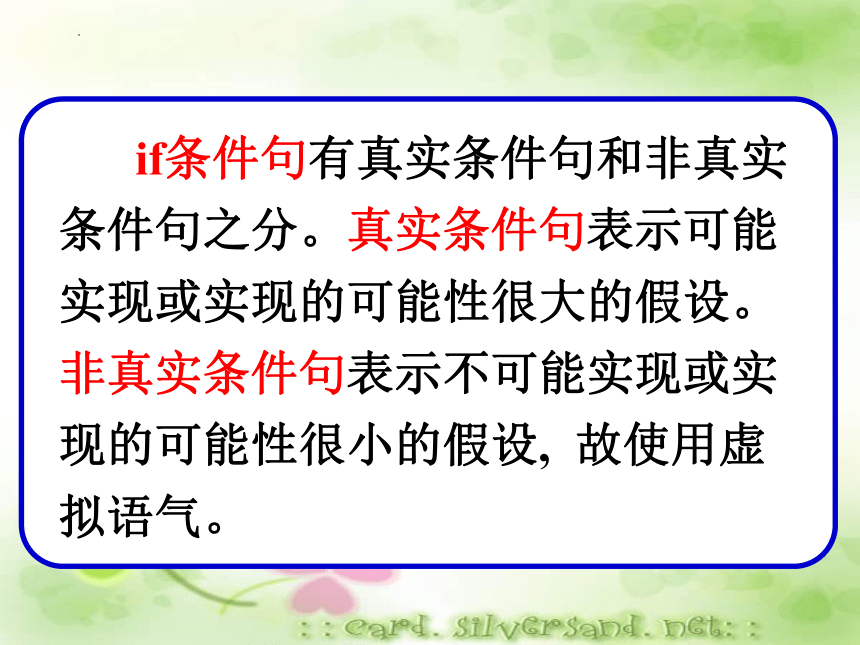
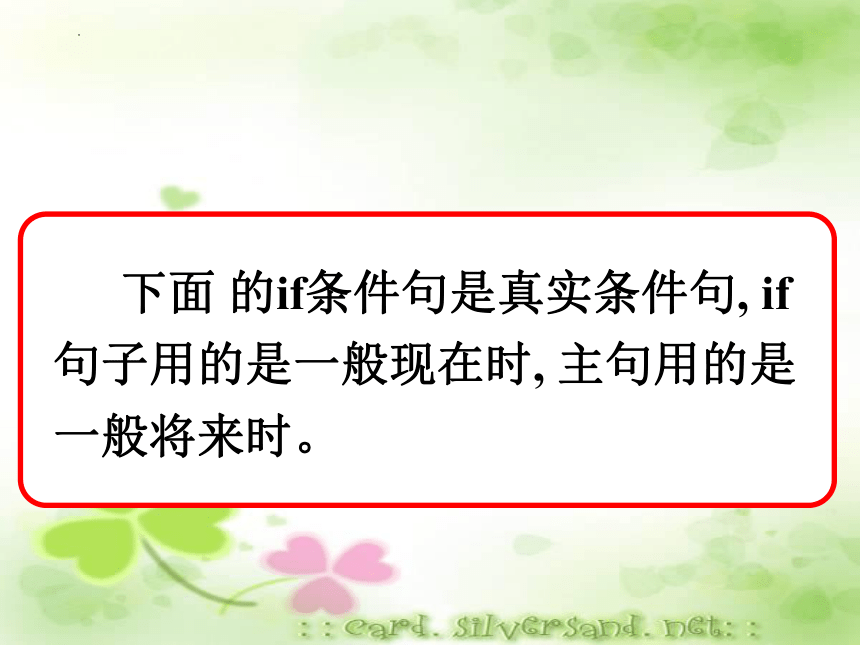
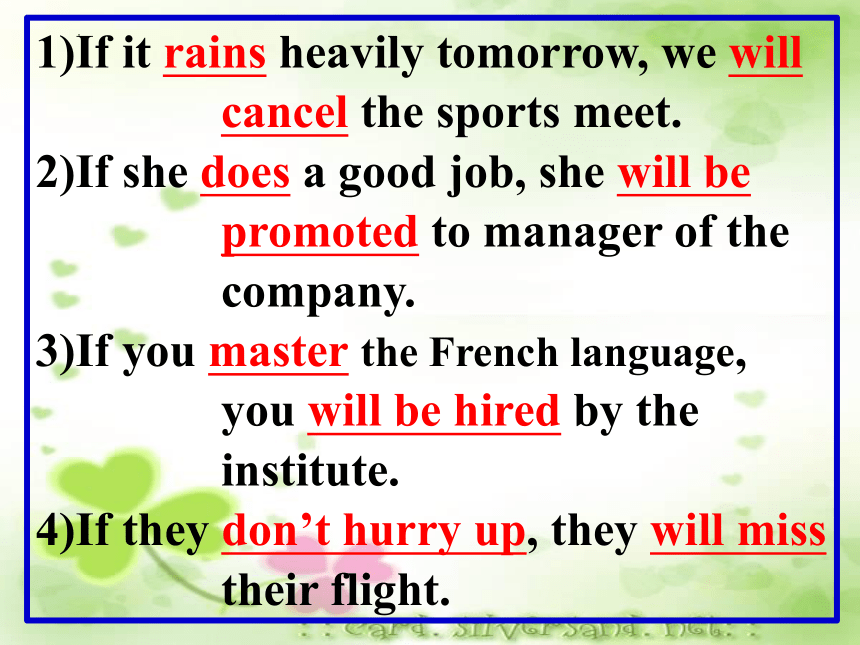
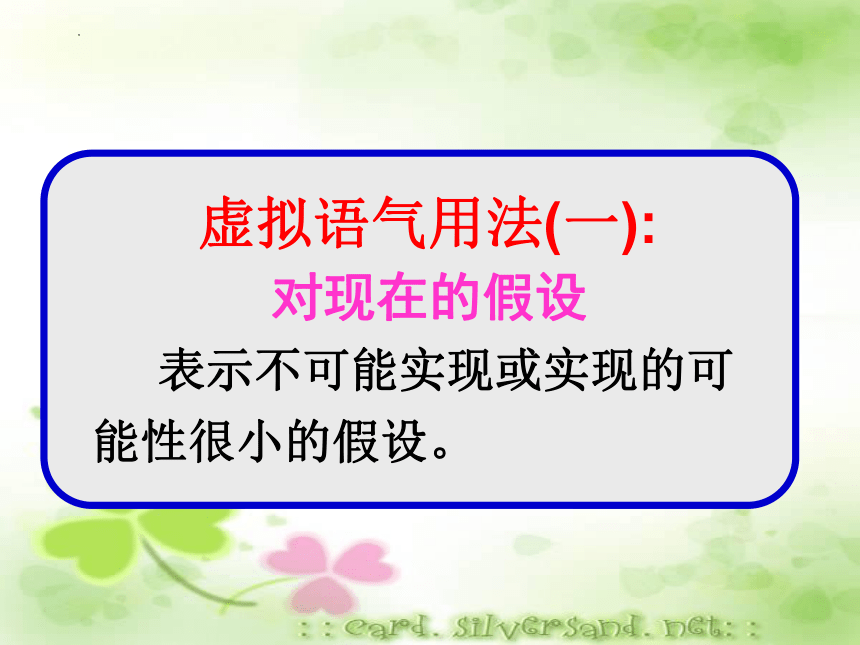
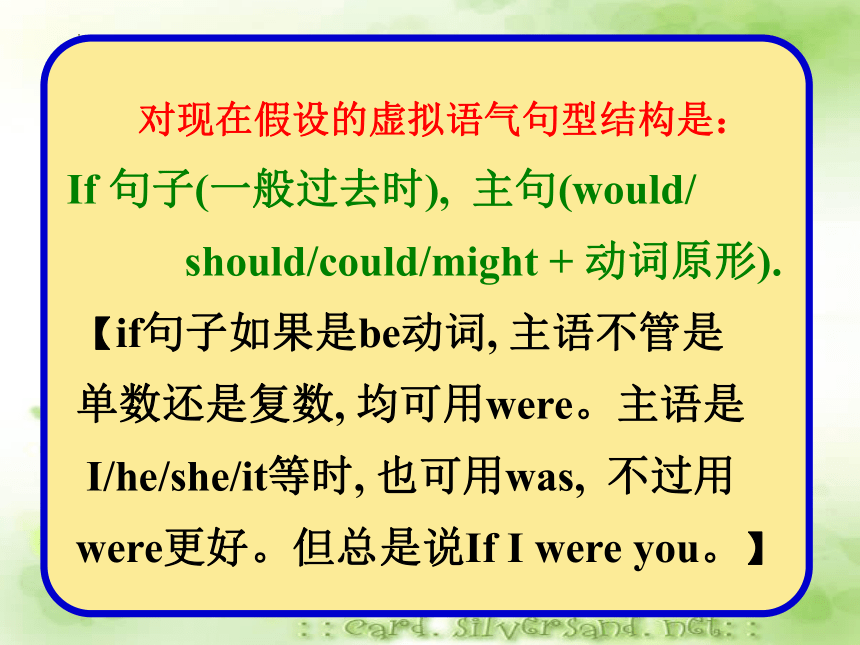

文档简介
(共132张PPT)
英语语法
虚 拟 语 气
The Subjunctive Mood
英语中的语气可以分为:
陈述语气、祈使语气、虚拟语气。
陈述语气: 用来讲述事实, 有肯定、否定、
询问和感叹等形式。谓语动词
有人称、数和时态的变化。
祈使语气: 用于表请求、命令、叮嘱、邀
请、祝愿、劝告、建议、警告、威胁、禁止、粗暴、厌恶等。以动词原形起句。
虚拟语气:
①表示不可能实现或者实现的可能性
很小的假设;
②表达主观愿望、怀疑、猜测、建议
或者某些强烈情感等。
虚拟语气的谓语动词用特殊形式。
虚拟语气的结构主要有:
①一般过去时(是be动词的常用were)
②过去将来时(would do/be…)
③过去完成时(had done/been…)
④should do/be…
⑤would/should/could/might do/be…
⑥would/should/could/might have done/been…
if条件句有真实条件句和非真实条件句之分。真实条件句表示可能
实现或实现的可能性很大的假设。
非真实条件句表示不可能实现或实
现的可能性很小的假设, 故使用虚
拟语气。
下面 的if条件句是真实条件句, if句子用的是一般现在时, 主句用的是一般将来时。
1)If it rains heavily tomorrow, we will cancel the sports meet.
2)If she does a good job, she will be promoted to manager of the company.
3)If you master the French language, you will be hired by the institute.
4)If they don’t hurry up, they will miss their flight.
虚拟语气用法(一):
对现在的假设
表示不可能实现或实现的可能性很小的假设。
对现在假设的虚拟语气句型结构是:
If 句子(一般过去时), 主句(would/
should/could/might + 动词原形).
【if句子如果是be动词, 主语不管是
单数还是复数, 均可用were。主语是
I/he/she/it等时, 也可用was, 不过用 were更好。但总是说If I were you。】
1)If she was/were alive today, she would be very happy.
2)If there were no air or water, there would be no living things on
the earth.
3)If we had enough money, we should/
would/might import more oil from abroad.
4)If I knew Russian, I would read the book in the original.
☆5)If I were you, I would take the bad man to the police station.
☆6)If it were not for the fact that she
can’t sing, I would invite her to
the party.
【If it were not for…: “要不是…”,
对现在或者将来的假设 】
【上面带☆号的两个句子, if 可省去,
但句子要倒装。】
7)Were there no modern telecommunications, we would have to wait for weeks to get
news from around the world.
8)Were it not for the support of the teachers, the student could not overcome her difficulty.
虚拟语气用法(二):
对过去的假设
表示绝不可能实现的假设。
对过去假设的虚拟语气句型结构是:
If 句子(过去完成时), 主句(would/
should/could/might + have done/been…).
1)If we had left a little earlier, we would have caught the first train.
2)If he had not hurt his leg, John would/might have won the race.
3)If the new safety system had been put
to use, the accident would never have happened.
4)If the weather had been better, we could/might have had a picnic. But it rained all day.
5)You did not let me drive. If we had driven in turn, you wouldn’t have got so tired
6)---Do you think George has passed the driving test
---No. If so, he would have driven his car to our college yesterday.
7)If it hadn’t been for your help, we would/could/might have been drowned.
【If it hadn’t been for…: “要不是…”,
对过去的假设】
【上面的全部七个句子, if 可省去,
但句子要倒装。】
8)Had I known about this computer program, a huge amount of time and energy would have been saved.
9)Had the governments and scientists
not worked together, AIDS-related deaths would not have fallen since their highest in 2005.
虚拟语气用法(三):
对将来的假设
表示不可能实现或实现的可
能性很小的假设。
对将来假设的虚拟语气句型结构是:
①If 句子(一般过去时),
②If 句子(主语+ should do…),
③If 句子(主语+ were to do…),
主句(would/should/could/might
+ 动词原形)
1)If it snowed tomorrow, they would go skiing.
☆2)If it should snow tomorrow, they would go skiing.
☆3)If it were to snow tomorrow, they would go skiing.
☆4)This printer is of good quality. If it should break down within the first year, we would repair it
at our expense.
【上面带☆号的句子, if 可省去,
但句子要倒装。】
5)Should you be fired, your health care and other benefits would not
be immediately cut off.
6)Should it rain tomorrow, we would have to put off the visit to the Yangpu Bridge.
虚拟语气用法(四):
错综时间条件句
在含有if虚拟条件句的结构中, 如果主句和从句的谓语动作不是同时发生时(即发生的时间不一致时), 虚拟语气的形式应作相应的调整, 这种
条件句叫错综时间条件句。
1)If they had started in the early morning, they would arrive in half an hour.
【从句是过去, 主句是将来。】
2)If you had asked him when you saw him last time, you would know what to do now.
【从句是过去, 主句是现在。】
3)If I had studied harder, I would be at university now.
【从句是过去, 主句是现在。】
4)Maybe if I had studied science, and
not literature then, I would be able to give you more help.
【从句是过去, 主句是现在或者将来。】
5)If you were healthy, we would have allowed you to climb the Himalayas.
【从句是现在, 主句是过去。】
6)If we had booked a table earlier, we
couldn’t be standing here in a queue.
【从句是过去, 主句是现在。】
7)We would be back in the hotel now if
you hadn’t lost the map.
【从句是过去, 主句是现在。】
8)If it had not been for his invitation the
other day, I should not be here now.
【从句是过去, 主句是现在。】
9)I was wearing a seatbelt. If I hadn’t
been wearing one, I would have been injured.
【从句是过去, 主句是过去。】
虚拟语气用法(五):
含蓄虚拟条件句
英语中某些假设的虚拟条件句不是通过if从句表达出来, 而是包含在某些短语、上下文或其他方式中, 其谓语也常用虚拟语气, 这种句子叫含蓄虚
拟条件句。
without (如果没有), but for (如果没有), with
(如果有), otherwise (否则/反之), or (否则/反之),
or else (否则/反之), but, 现在分词, 过去分词
等构成的短语就可以表达这种含蓄条件。without, but for, with短语就相当于一个if
条件句。含蓄虚拟条件句的谓语形式与if
虚拟条件句的谓语形式相同。
1)I was ill last week, otherwise/or I
would have taken part in the winter camp.
2)I am really busy now, otherwise/or I
would certainly go to the exhibition with you.
3)What a pity it was ! You missed the
sightseeing, or we would have
had a good time together.
4)---Do you have Betty’s phone number
---Yes. Otherwise, I wouldn’t have
been able to reach her yesterday.
5)The workers were not better organized,
otherwise they would have accomplished the task in half the time.
6)Thanks for your directions to the house;
we wouldn’t have found it otherwise.
7)With more money and better
technology, we would/could build more advanced warships.
8)Without electricity, human life would
be quite difficult today.
9)I couldn’t have gone through that
bitter period without your generous help.
10)The changes could not have taken
place without the open-door
policy.
11)We would/might/could/should have
starved to death but for your economic aid.
12)But for your advice, we could not
have done it so successfully.
13)But for the help of my English teacher,
I would not have won the first prize in the English Writing Competition.
14)Given more attention, the trees
would/could/might have grown better.
15)United as one, they wouldn’t have
been defeated by their enemies.
16)All things considered, the house
prices would be reasonable.
17)Having set out ten minutes earlier,
we would/could/might have prevented the accident.
18)---Pity you missed the lecture on
nuclear pollution.
---I would have attended it, but I was
busy preparing for a job interview.
19)I would have come sooner, but I
didn’t know that they were waiting for me.
20)People are recycling many things
which they would have thrown away in the past.
21)A few minutes earlier, and she would
have seen the famous female astronaut.
虚拟语气用法(六):
wish + that 宾语从句
wish式虚拟语气表示与事实
相反或不大可能实现的愿望。
通常有三种用法:
①对将来发生的事情表示祝愿或愿望:
wish that句子(would/could/might + 动词原形)
②表示与现在事实相反的愿望:
wish that句子(一般过去时)
③对过去发生的事情表示遗憾或后悔:
wish that 句子(过去完成时)
wish式虚拟语气的wish可以是一般现在时, 也可以是一般过去时, 但that宾语从句的
形式是固定的, 即宾语从句的谓语与wish同时, 宾语从句用一般过去时(be动词用were);宾语从句的谓语晚于wish时, 宾语从句用would/
could/might + 动词原形; 宾语从句的谓语比wish早发生时, 宾语从句用过去完成时。
wish虚拟语气的意思是:
希望; 但愿; 可惜; 要是...就好了
1)I wish/wished that I knew a second
language.
2)She wishes she were still a student,
because she misses the days we spent together so much.
3)How I wish every family had a large
house with a beautiful garden!
4)We wish/wished that human beings
would/could live on the moon in the future.
5)We wish/wished that we had studied
hard at school in those years.
6)How I wish I had seen her off at the
high-speed railway station, but I was too busy to get away.
虚拟语气用法(七):
suggest that (should式虚拟语气)
【宾语从句的动作发生在suggest 等动作之后】
suggest, propose, recommend, order/instruct/
command, direct, decide, resolve, determine,
desire, intend, demand, request, require, ask,
urge(强烈要求), insist (坚决要求), advocate, argue等
动词后接that宾语从句时, 从句用should do/
be 式虚拟语气, should可省去。
【 suggest 作 “ 暗示; 表明” 讲, 不这么用。】
1)She suggested/suggests that we
(should) have a party tonight.
2)The doctor recommended that you
(should) not swim after eating
a large meal.
3)Teachers recommend that parents
not allow their children under 12 to ride bicycles to school
for safety.
4)Professor William asked that Peter
(should) submit his research paper before the end of the month.
5)The customers demand the goods be delivered right to their homes.
6)The general ordered that all the troops
(should) leave the front line at midnight.
7)The local government decided that
the three factories (should)
be closed at once.
8)The report advocated that all the old
buildings (should) be fitted
with elevators.
9)Some people argue that our grain
(should) not be sold abroad.
10)I don’t intend that she should know
my future plan at this time.
11)He insists that they (should) be
given another chance to serve
the country.
12)She insisted that we (should)
organize a trip to the islands in
the South China Sea.
●13)She insisted that she hadn’t punished
the four naughty students.
【宾语从句的动作发生在insist动作之前】
●14)They insisted that they were innocent.
【宾语从句动词与insist动作同时】
●15)Her pale face suggests that she is
in poor health. (暗示)
●16)The smile on his face suggested that
he was satisfied with his life.
●17)The research suggests that stress
may change the way people make choices in predictable ways.
【 第16)第17)句suggest的意思是“表明” 】
虚拟语气用法(八):
as if/though 从句
as if/though可以用在be/look/feel/seem/appear/
act/behave/sound/smell/taste等动词之后, 引导一个从句 。这个从句可用虚拟语气, 也可陈述语气。用虚拟语气时表示不太符合实际的比喻, 用陈述语气时表示内容为事实或可能
为事实。在现代英语中, 有时即使从句内容
不是事实, 也可用陈述语气。
1)She looks as if she was/were very ill.
2)The man speaks English as though
he were an American.
3)The kind-hearted couple treat the
orphan very well as though
he were their own son.
4)When a pencil is partly in a glass of
water, it looks as if it were broken.
5)The USA completely ignores these
rules as if/though they never existed.
6)She talks as if she knew something
important about the political reform.
7)He did not sound as if he would trust
such a person.
8)She behaves as if she would donate a
large sum of money to the poor people.
9)It was John who broke the window.
Why are you talking to me as if
I had done it
10)The six men look as if/though they
had been hit by lightning.
11)They talked as if they had been
friends for many years.
●12)It looks as if the sky is (was/were)
going to clear.
●13)The pork smells as if it has already
gone bad.
●14)The house looks as if it is going to
collapse.
●15)They act as if they know where
we are going.
●16)The old people behave as if their
memories have failed totally.
●17)You sound as if you are more
concerned about your social
life rather than the job itself.
虚拟语气用法(九):
if only + 陈述句
if only式虚拟语气表示与事实相反的愿望, 可以是对现在或将来或过去的愿望。
if only后虚拟语气的形式与 wish后所接的动词形式相同。if only 通常独立使用, 没有主句, 但有时也可能有主句。if only的意思是: 但愿; 真希望; 要是/只要…就好了; 要是...该多好啊。
1)If only I knew everything in the world!
2)If only we had another chance to
serve the villagers!
3)If only I were free to do what I like!
4)If only she would/could pass the
English listening test!
5)If only we could get seven tickets to
the symphony concert!
6)If only you had come to our wedding
on October 1!
7)Look at the terrible situation I am in.
If only I had listened to my grandparents!
8)If only we hadn’t wasted so much time
on computer games in the past!
●9)If only he had lain quietly as the
doctor instructed, he would not suffer so much now.
●10)If he had only known he was
building his own house, he would have done it all so differently.
●only if + 陈述句: 只有; 只要。
only if 条件状语从句在句首时,
主句要倒装。
only if 结构有时也写成 only ... if..., 意思不变。
1)You will win the match only if you
train hard.
2)The football match will be cancelled
only if it rains cats and dogs.
3)Water will freeze only if the
temperature drops to 0℃.
●4)I will only go abroad to study if you
lend me two million dollars.
5)Only if a headteacher has given
permission, is a student allowed
to leave the school.
6)Only if you eat the correct foods,
will you be able to keep fit and
stay healthy.
7)Only if you work hard, can you achieve
your goal.
虚拟语气用法(十):
It is/was suggested that 句子.
【that句子用should式虚拟语气】
It is/was suggested/proposed/advised/
recommended/desired/requested/
required/demanded/urged/ordered/
commanded/decided/determined
that 句子(should虚拟语气)
在上句型中, it是形式主语, that句子
为主语从句, 是真正主语。that句子
用should式虚拟语气, should 可以省
去。
1)It is suggested that the question
(should) be discussed at the next meeting.
2)It is desired that the new traffic
regulations (should) be brought
to the attention of all drivers.
3)It is ordered that the soldiers (should)
be sent to the battlefield before dawn.
4)It is requested that Miss Green (should)
give a performance at the music festival.
5)It is urged that the library (should) be
kept open during the vacation.
6)It was demanded that they (should)
not build power plants on the upper reaches of the river.
7)It was arranged that the ten doctors
(should) go to help the people
in Sichuan Province.
8)It has been decided that the military
training (should) be put off till next month.
9)It has been recommended that I
(should) try these pills for the flu.
虚拟语气用法(十一):
It is/was important that 句子.
【that句子用should式虚拟语气】
It is important/essential/vital/necessary/
right/wrong/strange/odd/queer/funny/
curious/fortunate/better/best/improper/
regrettable/remarkable/sad/annoying/
urgent/critical/disappointing/proper/
frightening/shocking/astonishing/
surprising/natural/possible/desirable/
advisable/admirable/extraordinary/
upsetting/pleasing that 句子(should)
在上句型中, it是形式主语, that句子为主语从句, 是真正主语。that句子常常
用should式虚拟语气, 表达某种比较浓的感彩。 此种用法的should的意思是
“应该; 居然; 竟然” 。
若句意不特别强调感彩, that句子用陈述语气。
1)It is necessary/important that you
(should) get ready for the national college entrance exam.
2)It is natural that the poor residents
(should) get some money from
the government.
3)It is best that you (should) cancel
your trip to Europe at once.
4)It is strange that the girl (should) be
so clever/stubborn.
5)It is advisable that everyone (should)
have a compass when they go hiking in the national park.
6)It is desirable that dying patients
(should) receive maximum relief of pain and suffering.
7)It is disappointing that I should have
missed the wonderful movie last night!
8)It’s astonishing that she should say
that sort of thing to you.
9)It is surprising that your aunt should
have married an old man.
10)It is annoying that people should go
to the reading-room only to sleep.
11)It is essential that all these data
(should) be checked twice.
12)It is curious that they should have
failed to win the battle.
下面的that句子是陈述语气。
1)It’s strange that there is a power failure
in the whole city.
2)It’s strange that he has left the factory
without telling anybody.
3)It is surprising that so many ancient
coins were found in the grave.
4)It is curious that the computer often
breaks down with no reason.
5)It is remarkable that not one of them
is talking about these issues.
6)It is funny that they are trying to
persuade the naughty boy to study hard.
虚拟语气用法(十二):
suggestion等名词后的同位语从
句和表语从句用should式虚拟语
气。
suggestion/recommendation/proposal/
advice/order/plan/idea/request/demand/
requirement/determination/decision/
aim/regulation/importance/desire/wish/
instruction/motion等名词后的同位语
从句或表语从句用should式虚拟语气, should可以省去。
1)The suggestion that we (should)
postpone the mid-term exams until next month is new to us.
2)We all agreed to her proposal that
we (should) go to Xinjiang for sightseeing.
3)The boss gave orders that the project
(should) be completed before
the end of this year.
4)The president refused a request that
he (should) take a Covid-19 test when he arrived in Moscow, preventing Russia getting hold
of his DNA.
5)We all agree to her plan that we
(should) store more oil for future use.
6)My advice is that you (should)
practise speaking English as often as possible.
7)Their idea is that an unmanned spacecraft (should) be sent
to explore the planet first.
8)Their demand is that the government
(should) take steps to change their poor living conditions.
9)The prime minister’s recommendation
is that Russia (should) withdraw
its troops from the island.
10)The regulation is that you (should)
not tell other people the password
of your e-mail account.
虚拟语气用法(十三):
几个固定结构的虚拟语气
①It is (high/about/the very) time that ...:
该某人做什么了。
在上结构中, that句子用一般过去 时或者should式虚拟语气, should通常不能省去。
1)It is (high) time that we left/should
leave home for the school.
2)It is time that you thought/should
think about your future.
3)Isn’t it time you got down to marking
the students’ papers
4)Jack is a great talker. It’s high time
that he did something instead of just talking.
②It is a pity that...: 真遗憾; 真可惜
It is a shame that...:
真遗憾; 真可惜; 真可耻/丢人
上面的句型如果表达说话人的某种感情或感受, 比如:惊奇、懊悔、失望、不满等, 句子要用should式虚拟语气。should通常不能省略, should的意思是 “居然; 竞然”。该句型that句子的动词有两种形式:表示现在或将来发生的事, 用should do/be, 表示过去发生的事情用should have done/been。上面的句型如果不表达说话人的某种感情或感受, that句子用陈述语气。
1)It is a pity that she should refuse my
invitation.
2)It is a pity (that) she should have
failed the driving test yesterday.
●3)It is a pity that she failed the driving
test yesterday.
●4)It is a pity that you don’t know the
German language.
5)It is a shame that they should attempt to
blow up the statues of the heroes
who liberated their country.
6)It is a shame that we should have lost
so many important customers.
●7)It is a shame that we cannot do what
we want to do in life.
●8)It is a shame that the heavy rain
spoiled our journey last week.
③would rather, had rather,
would sooner之后的宾语
从句用虚拟语气。
would rather, had rather, would sooner之后的that宾语从句常表示与客观事实不相符的一种愿望, 故使
用虚拟语气。其虚拟语气的结构为: 现在或将来的愿望, 用一般过去时; 过去的愿望, 用过去完成时。
三个短语的意思是: 宁愿; 宁可
1)I would rather/sooner that he knew
where we are now.
2)We would rather they did something
about it instead of just talking about it.
3)I had rather you didn’t make any
comment on the issue for the time being.
4)We would rather/sooner our parents
were here with us now.
5)We would rather our daughter stayed
at home with us, but it is her choice, and she is not a child any longer.
6)I would rather that the girls took part
in the summer camp next year.
7)She would rather/sooner you picked
her up at the airport tomorrow morning.
8)He had/would rather that his brother
attended Peking University
next autumn.
9)I would rather/sooner that he had
passed the college entrance exam last year.
10)They would rather/sooner that the
news had not been broadcast on TV yesterday evening.
④for fear that, in case, lest后
的目的状语从句用should式虚拟语气。
for fear that(唯恐; 以免), in case(以防; 以防万一), lest(唯恐; 免得; 以免)引导的目的状语从句常常用should do/be式虚拟语气, should可以省去。
in case, for fear that后的句子也可以用其他动词形式。
1)Kate is working hard for fear that she
(should) fall behind her classmates.
2)I will not make a noise for fear that I
(should) disturb the sleeping
doctors.
3)His father examined the ladder again
for fear that he (should) fall off
it.
4)The spy was afraid to pull back the
curtain lest anyone (should) see him.
5)He started out earlier lest he (should)
be late for the lecture.
6)I wrote down my uncle’s phone
number lest I (should) forget it.
7)We have prepared more water in case
we (should) need it in the desert.
8)My mother put an overcoat over you
in case you (should) catch a cold.
●9)You had better take an umbrella with
you in case it rains.
●10)I bought her house at once in case
she changed her mind.
●11)She set off very early for fear that
she might/would be late for
the interview.
●12)The officials often avoid making
decisions for fear that they will be accused of corruption.
⑤以whatever, whichever, whenever,
whoever, wherever, however和no matter
引导的让步状语从句, 常用may式虚拟语气。如果指现在或者将来, 用may do/be结构; 如果指过去, 用may have done/been结构。指现在或者将来, 上
面的让步状语从句用陈述语气的一般
现在时也可以。
注意: 在让步状语从句中
no matter who = whoever
no matter whom = whomever
no matter what = whatever
no matter where = wherever
no matter when = whenever
no matter which = whichever
no matter how = however
意思是: 不论...; 无论...; 不管...
1)Whatever may happen, we will
complete the project on time.
●Whatever happens, we will complete
the project on time.
2)Wherever you may work, you must
get along well with your workmates.
●No matter where you work, you must
get along well with your workmates.
3)However late he may come back, his
mother will wait for him.
●No matter how late he comes back,
his mother will wait for him.
4)Whoever we may shake hands with,
we usually have to take our gloves off.
●No matter who we shake hands with,
we usually have to take our gloves off.
5)You mustn’t look down upon other
people whatever progress you may have made.
=You mustn’t look down upon other people no matter what progress you may have made.
⑥amazed, angry, annoyed, sorry,
surprised, astonished, disappointed,
frightened, happy, proud, pleased,
upset等后面的原因状语从句, 如
果要表达“居然; 竞然”之意, 要
用should式虚拟语气。
指现在或将来, 用should do式虚拟语气; 指过去, 用should have done式虚拟语气。should通常不能省略。
1)He is angry that she should abuse his
sister.
2)I am very happy that he should answer
such a difficult question.
3)They are disappointed that nobody
should believe them.
4)We are very sorry that you should
have failed in the national college entrance exam last week.
5)She was very surprised that the man
who had developed communism should have lived and died in London.
⑦在so that和in order that所引导
的目的状语从句中, 谓语动词
常用can/could/may/might do
结构表示虚拟语气。
1)These soldiers risk their lives in order
that we may live more safely.
2)He locked the door so that we might
continue the meeting undisturbed.
3)You must speak louder so that you
can be heard by all of us.
4)The little boy saved every coin in
order that he could buy his mother a gift on Mother’s Day.
5)Her parents began to learn computer
science at 50 so that they could keep up with the times.
⑧providing/provided/supposing/
suppose/assuming (that)...等引
导的假设条件句。
providing/provided/supposing/
suppose/assuming (that)...等引导的假设条件句,其功能相当于if 条件句, 意思是: 如果;假如。这个句型既可以表示真实条件(用陈述语式), 也可以表示非真实条件(用虚拟语气)。此句型用于虚拟语气时表示对现在或将来的假设, 动词多用
过去式。
1)Providing you had the opportunity to
study abroad, which country would you go to
2)Suppose/Supposing that it rained
heavily, we would still go rock climbing.
3)Supposing I accepted this apartment,
what would the judges say
4)Suppose/Supposing that there were
no gravity, objects would not fall to ground when dropped.
5)Assuming he didn’t get himself killed
in the process, he might then murder his wife.
6)Assuming that you had one million
pounds, what would you do first
●7)Supposing that there is no clean
water in the region, what shall we drink
●8)Suppose/Supposing that he doesn’t
agree to the plan, what will
you do
●9)You can use my bike providing that
you take good care of it.
●10)Even assuming that smokers do
see the health warnings, I doubt they will take any notice.
Thanks for your watching !
英语语法
虚 拟 语 气
The Subjunctive Mood
英语中的语气可以分为:
陈述语气、祈使语气、虚拟语气。
陈述语气: 用来讲述事实, 有肯定、否定、
询问和感叹等形式。谓语动词
有人称、数和时态的变化。
祈使语气: 用于表请求、命令、叮嘱、邀
请、祝愿、劝告、建议、警告、威胁、禁止、粗暴、厌恶等。以动词原形起句。
虚拟语气:
①表示不可能实现或者实现的可能性
很小的假设;
②表达主观愿望、怀疑、猜测、建议
或者某些强烈情感等。
虚拟语气的谓语动词用特殊形式。
虚拟语气的结构主要有:
①一般过去时(是be动词的常用were)
②过去将来时(would do/be…)
③过去完成时(had done/been…)
④should do/be…
⑤would/should/could/might do/be…
⑥would/should/could/might have done/been…
if条件句有真实条件句和非真实条件句之分。真实条件句表示可能
实现或实现的可能性很大的假设。
非真实条件句表示不可能实现或实
现的可能性很小的假设, 故使用虚
拟语气。
下面 的if条件句是真实条件句, if句子用的是一般现在时, 主句用的是一般将来时。
1)If it rains heavily tomorrow, we will cancel the sports meet.
2)If she does a good job, she will be promoted to manager of the company.
3)If you master the French language, you will be hired by the institute.
4)If they don’t hurry up, they will miss their flight.
虚拟语气用法(一):
对现在的假设
表示不可能实现或实现的可能性很小的假设。
对现在假设的虚拟语气句型结构是:
If 句子(一般过去时), 主句(would/
should/could/might + 动词原形).
【if句子如果是be动词, 主语不管是
单数还是复数, 均可用were。主语是
I/he/she/it等时, 也可用was, 不过用 were更好。但总是说If I were you。】
1)If she was/were alive today, she would be very happy.
2)If there were no air or water, there would be no living things on
the earth.
3)If we had enough money, we should/
would/might import more oil from abroad.
4)If I knew Russian, I would read the book in the original.
☆5)If I were you, I would take the bad man to the police station.
☆6)If it were not for the fact that she
can’t sing, I would invite her to
the party.
【If it were not for…: “要不是…”,
对现在或者将来的假设 】
【上面带☆号的两个句子, if 可省去,
但句子要倒装。】
7)Were there no modern telecommunications, we would have to wait for weeks to get
news from around the world.
8)Were it not for the support of the teachers, the student could not overcome her difficulty.
虚拟语气用法(二):
对过去的假设
表示绝不可能实现的假设。
对过去假设的虚拟语气句型结构是:
If 句子(过去完成时), 主句(would/
should/could/might + have done/been…).
1)If we had left a little earlier, we would have caught the first train.
2)If he had not hurt his leg, John would/might have won the race.
3)If the new safety system had been put
to use, the accident would never have happened.
4)If the weather had been better, we could/might have had a picnic. But it rained all day.
5)You did not let me drive. If we had driven in turn, you wouldn’t have got so tired
6)---Do you think George has passed the driving test
---No. If so, he would have driven his car to our college yesterday.
7)If it hadn’t been for your help, we would/could/might have been drowned.
【If it hadn’t been for…: “要不是…”,
对过去的假设】
【上面的全部七个句子, if 可省去,
但句子要倒装。】
8)Had I known about this computer program, a huge amount of time and energy would have been saved.
9)Had the governments and scientists
not worked together, AIDS-related deaths would not have fallen since their highest in 2005.
虚拟语气用法(三):
对将来的假设
表示不可能实现或实现的可
能性很小的假设。
对将来假设的虚拟语气句型结构是:
①If 句子(一般过去时),
②If 句子(主语+ should do…),
③If 句子(主语+ were to do…),
主句(would/should/could/might
+ 动词原形)
1)If it snowed tomorrow, they would go skiing.
☆2)If it should snow tomorrow, they would go skiing.
☆3)If it were to snow tomorrow, they would go skiing.
☆4)This printer is of good quality. If it should break down within the first year, we would repair it
at our expense.
【上面带☆号的句子, if 可省去,
但句子要倒装。】
5)Should you be fired, your health care and other benefits would not
be immediately cut off.
6)Should it rain tomorrow, we would have to put off the visit to the Yangpu Bridge.
虚拟语气用法(四):
错综时间条件句
在含有if虚拟条件句的结构中, 如果主句和从句的谓语动作不是同时发生时(即发生的时间不一致时), 虚拟语气的形式应作相应的调整, 这种
条件句叫错综时间条件句。
1)If they had started in the early morning, they would arrive in half an hour.
【从句是过去, 主句是将来。】
2)If you had asked him when you saw him last time, you would know what to do now.
【从句是过去, 主句是现在。】
3)If I had studied harder, I would be at university now.
【从句是过去, 主句是现在。】
4)Maybe if I had studied science, and
not literature then, I would be able to give you more help.
【从句是过去, 主句是现在或者将来。】
5)If you were healthy, we would have allowed you to climb the Himalayas.
【从句是现在, 主句是过去。】
6)If we had booked a table earlier, we
couldn’t be standing here in a queue.
【从句是过去, 主句是现在。】
7)We would be back in the hotel now if
you hadn’t lost the map.
【从句是过去, 主句是现在。】
8)If it had not been for his invitation the
other day, I should not be here now.
【从句是过去, 主句是现在。】
9)I was wearing a seatbelt. If I hadn’t
been wearing one, I would have been injured.
【从句是过去, 主句是过去。】
虚拟语气用法(五):
含蓄虚拟条件句
英语中某些假设的虚拟条件句不是通过if从句表达出来, 而是包含在某些短语、上下文或其他方式中, 其谓语也常用虚拟语气, 这种句子叫含蓄虚
拟条件句。
without (如果没有), but for (如果没有), with
(如果有), otherwise (否则/反之), or (否则/反之),
or else (否则/反之), but, 现在分词, 过去分词
等构成的短语就可以表达这种含蓄条件。without, but for, with短语就相当于一个if
条件句。含蓄虚拟条件句的谓语形式与if
虚拟条件句的谓语形式相同。
1)I was ill last week, otherwise/or I
would have taken part in the winter camp.
2)I am really busy now, otherwise/or I
would certainly go to the exhibition with you.
3)What a pity it was ! You missed the
sightseeing, or we would have
had a good time together.
4)---Do you have Betty’s phone number
---Yes. Otherwise, I wouldn’t have
been able to reach her yesterday.
5)The workers were not better organized,
otherwise they would have accomplished the task in half the time.
6)Thanks for your directions to the house;
we wouldn’t have found it otherwise.
7)With more money and better
technology, we would/could build more advanced warships.
8)Without electricity, human life would
be quite difficult today.
9)I couldn’t have gone through that
bitter period without your generous help.
10)The changes could not have taken
place without the open-door
policy.
11)We would/might/could/should have
starved to death but for your economic aid.
12)But for your advice, we could not
have done it so successfully.
13)But for the help of my English teacher,
I would not have won the first prize in the English Writing Competition.
14)Given more attention, the trees
would/could/might have grown better.
15)United as one, they wouldn’t have
been defeated by their enemies.
16)All things considered, the house
prices would be reasonable.
17)Having set out ten minutes earlier,
we would/could/might have prevented the accident.
18)---Pity you missed the lecture on
nuclear pollution.
---I would have attended it, but I was
busy preparing for a job interview.
19)I would have come sooner, but I
didn’t know that they were waiting for me.
20)People are recycling many things
which they would have thrown away in the past.
21)A few minutes earlier, and she would
have seen the famous female astronaut.
虚拟语气用法(六):
wish + that 宾语从句
wish式虚拟语气表示与事实
相反或不大可能实现的愿望。
通常有三种用法:
①对将来发生的事情表示祝愿或愿望:
wish that句子(would/could/might + 动词原形)
②表示与现在事实相反的愿望:
wish that句子(一般过去时)
③对过去发生的事情表示遗憾或后悔:
wish that 句子(过去完成时)
wish式虚拟语气的wish可以是一般现在时, 也可以是一般过去时, 但that宾语从句的
形式是固定的, 即宾语从句的谓语与wish同时, 宾语从句用一般过去时(be动词用were);宾语从句的谓语晚于wish时, 宾语从句用would/
could/might + 动词原形; 宾语从句的谓语比wish早发生时, 宾语从句用过去完成时。
wish虚拟语气的意思是:
希望; 但愿; 可惜; 要是...就好了
1)I wish/wished that I knew a second
language.
2)She wishes she were still a student,
because she misses the days we spent together so much.
3)How I wish every family had a large
house with a beautiful garden!
4)We wish/wished that human beings
would/could live on the moon in the future.
5)We wish/wished that we had studied
hard at school in those years.
6)How I wish I had seen her off at the
high-speed railway station, but I was too busy to get away.
虚拟语气用法(七):
suggest that (should式虚拟语气)
【宾语从句的动作发生在suggest 等动作之后】
suggest, propose, recommend, order/instruct/
command, direct, decide, resolve, determine,
desire, intend, demand, request, require, ask,
urge(强烈要求), insist (坚决要求), advocate, argue等
动词后接that宾语从句时, 从句用should do/
be 式虚拟语气, should可省去。
【 suggest 作 “ 暗示; 表明” 讲, 不这么用。】
1)She suggested/suggests that we
(should) have a party tonight.
2)The doctor recommended that you
(should) not swim after eating
a large meal.
3)Teachers recommend that parents
not allow their children under 12 to ride bicycles to school
for safety.
4)Professor William asked that Peter
(should) submit his research paper before the end of the month.
5)The customers demand the goods be delivered right to their homes.
6)The general ordered that all the troops
(should) leave the front line at midnight.
7)The local government decided that
the three factories (should)
be closed at once.
8)The report advocated that all the old
buildings (should) be fitted
with elevators.
9)Some people argue that our grain
(should) not be sold abroad.
10)I don’t intend that she should know
my future plan at this time.
11)He insists that they (should) be
given another chance to serve
the country.
12)She insisted that we (should)
organize a trip to the islands in
the South China Sea.
●13)She insisted that she hadn’t punished
the four naughty students.
【宾语从句的动作发生在insist动作之前】
●14)They insisted that they were innocent.
【宾语从句动词与insist动作同时】
●15)Her pale face suggests that she is
in poor health. (暗示)
●16)The smile on his face suggested that
he was satisfied with his life.
●17)The research suggests that stress
may change the way people make choices in predictable ways.
【 第16)第17)句suggest的意思是“表明” 】
虚拟语气用法(八):
as if/though 从句
as if/though可以用在be/look/feel/seem/appear/
act/behave/sound/smell/taste等动词之后, 引导一个从句 。这个从句可用虚拟语气, 也可陈述语气。用虚拟语气时表示不太符合实际的比喻, 用陈述语气时表示内容为事实或可能
为事实。在现代英语中, 有时即使从句内容
不是事实, 也可用陈述语气。
1)She looks as if she was/were very ill.
2)The man speaks English as though
he were an American.
3)The kind-hearted couple treat the
orphan very well as though
he were their own son.
4)When a pencil is partly in a glass of
water, it looks as if it were broken.
5)The USA completely ignores these
rules as if/though they never existed.
6)She talks as if she knew something
important about the political reform.
7)He did not sound as if he would trust
such a person.
8)She behaves as if she would donate a
large sum of money to the poor people.
9)It was John who broke the window.
Why are you talking to me as if
I had done it
10)The six men look as if/though they
had been hit by lightning.
11)They talked as if they had been
friends for many years.
●12)It looks as if the sky is (was/were)
going to clear.
●13)The pork smells as if it has already
gone bad.
●14)The house looks as if it is going to
collapse.
●15)They act as if they know where
we are going.
●16)The old people behave as if their
memories have failed totally.
●17)You sound as if you are more
concerned about your social
life rather than the job itself.
虚拟语气用法(九):
if only + 陈述句
if only式虚拟语气表示与事实相反的愿望, 可以是对现在或将来或过去的愿望。
if only后虚拟语气的形式与 wish后所接的动词形式相同。if only 通常独立使用, 没有主句, 但有时也可能有主句。if only的意思是: 但愿; 真希望; 要是/只要…就好了; 要是...该多好啊。
1)If only I knew everything in the world!
2)If only we had another chance to
serve the villagers!
3)If only I were free to do what I like!
4)If only she would/could pass the
English listening test!
5)If only we could get seven tickets to
the symphony concert!
6)If only you had come to our wedding
on October 1!
7)Look at the terrible situation I am in.
If only I had listened to my grandparents!
8)If only we hadn’t wasted so much time
on computer games in the past!
●9)If only he had lain quietly as the
doctor instructed, he would not suffer so much now.
●10)If he had only known he was
building his own house, he would have done it all so differently.
●only if + 陈述句: 只有; 只要。
only if 条件状语从句在句首时,
主句要倒装。
only if 结构有时也写成 only ... if..., 意思不变。
1)You will win the match only if you
train hard.
2)The football match will be cancelled
only if it rains cats and dogs.
3)Water will freeze only if the
temperature drops to 0℃.
●4)I will only go abroad to study if you
lend me two million dollars.
5)Only if a headteacher has given
permission, is a student allowed
to leave the school.
6)Only if you eat the correct foods,
will you be able to keep fit and
stay healthy.
7)Only if you work hard, can you achieve
your goal.
虚拟语气用法(十):
It is/was suggested that 句子.
【that句子用should式虚拟语气】
It is/was suggested/proposed/advised/
recommended/desired/requested/
required/demanded/urged/ordered/
commanded/decided/determined
that 句子(should虚拟语气)
在上句型中, it是形式主语, that句子
为主语从句, 是真正主语。that句子
用should式虚拟语气, should 可以省
去。
1)It is suggested that the question
(should) be discussed at the next meeting.
2)It is desired that the new traffic
regulations (should) be brought
to the attention of all drivers.
3)It is ordered that the soldiers (should)
be sent to the battlefield before dawn.
4)It is requested that Miss Green (should)
give a performance at the music festival.
5)It is urged that the library (should) be
kept open during the vacation.
6)It was demanded that they (should)
not build power plants on the upper reaches of the river.
7)It was arranged that the ten doctors
(should) go to help the people
in Sichuan Province.
8)It has been decided that the military
training (should) be put off till next month.
9)It has been recommended that I
(should) try these pills for the flu.
虚拟语气用法(十一):
It is/was important that 句子.
【that句子用should式虚拟语气】
It is important/essential/vital/necessary/
right/wrong/strange/odd/queer/funny/
curious/fortunate/better/best/improper/
regrettable/remarkable/sad/annoying/
urgent/critical/disappointing/proper/
frightening/shocking/astonishing/
surprising/natural/possible/desirable/
advisable/admirable/extraordinary/
upsetting/pleasing that 句子(should)
在上句型中, it是形式主语, that句子为主语从句, 是真正主语。that句子常常
用should式虚拟语气, 表达某种比较浓的感彩。 此种用法的should的意思是
“应该; 居然; 竟然” 。
若句意不特别强调感彩, that句子用陈述语气。
1)It is necessary/important that you
(should) get ready for the national college entrance exam.
2)It is natural that the poor residents
(should) get some money from
the government.
3)It is best that you (should) cancel
your trip to Europe at once.
4)It is strange that the girl (should) be
so clever/stubborn.
5)It is advisable that everyone (should)
have a compass when they go hiking in the national park.
6)It is desirable that dying patients
(should) receive maximum relief of pain and suffering.
7)It is disappointing that I should have
missed the wonderful movie last night!
8)It’s astonishing that she should say
that sort of thing to you.
9)It is surprising that your aunt should
have married an old man.
10)It is annoying that people should go
to the reading-room only to sleep.
11)It is essential that all these data
(should) be checked twice.
12)It is curious that they should have
failed to win the battle.
下面的that句子是陈述语气。
1)It’s strange that there is a power failure
in the whole city.
2)It’s strange that he has left the factory
without telling anybody.
3)It is surprising that so many ancient
coins were found in the grave.
4)It is curious that the computer often
breaks down with no reason.
5)It is remarkable that not one of them
is talking about these issues.
6)It is funny that they are trying to
persuade the naughty boy to study hard.
虚拟语气用法(十二):
suggestion等名词后的同位语从
句和表语从句用should式虚拟语
气。
suggestion/recommendation/proposal/
advice/order/plan/idea/request/demand/
requirement/determination/decision/
aim/regulation/importance/desire/wish/
instruction/motion等名词后的同位语
从句或表语从句用should式虚拟语气, should可以省去。
1)The suggestion that we (should)
postpone the mid-term exams until next month is new to us.
2)We all agreed to her proposal that
we (should) go to Xinjiang for sightseeing.
3)The boss gave orders that the project
(should) be completed before
the end of this year.
4)The president refused a request that
he (should) take a Covid-19 test when he arrived in Moscow, preventing Russia getting hold
of his DNA.
5)We all agree to her plan that we
(should) store more oil for future use.
6)My advice is that you (should)
practise speaking English as often as possible.
7)Their idea is that an unmanned spacecraft (should) be sent
to explore the planet first.
8)Their demand is that the government
(should) take steps to change their poor living conditions.
9)The prime minister’s recommendation
is that Russia (should) withdraw
its troops from the island.
10)The regulation is that you (should)
not tell other people the password
of your e-mail account.
虚拟语气用法(十三):
几个固定结构的虚拟语气
①It is (high/about/the very) time that ...:
该某人做什么了。
在上结构中, that句子用一般过去 时或者should式虚拟语气, should通常不能省去。
1)It is (high) time that we left/should
leave home for the school.
2)It is time that you thought/should
think about your future.
3)Isn’t it time you got down to marking
the students’ papers
4)Jack is a great talker. It’s high time
that he did something instead of just talking.
②It is a pity that...: 真遗憾; 真可惜
It is a shame that...:
真遗憾; 真可惜; 真可耻/丢人
上面的句型如果表达说话人的某种感情或感受, 比如:惊奇、懊悔、失望、不满等, 句子要用should式虚拟语气。should通常不能省略, should的意思是 “居然; 竞然”。该句型that句子的动词有两种形式:表示现在或将来发生的事, 用should do/be, 表示过去发生的事情用should have done/been。上面的句型如果不表达说话人的某种感情或感受, that句子用陈述语气。
1)It is a pity that she should refuse my
invitation.
2)It is a pity (that) she should have
failed the driving test yesterday.
●3)It is a pity that she failed the driving
test yesterday.
●4)It is a pity that you don’t know the
German language.
5)It is a shame that they should attempt to
blow up the statues of the heroes
who liberated their country.
6)It is a shame that we should have lost
so many important customers.
●7)It is a shame that we cannot do what
we want to do in life.
●8)It is a shame that the heavy rain
spoiled our journey last week.
③would rather, had rather,
would sooner之后的宾语
从句用虚拟语气。
would rather, had rather, would sooner之后的that宾语从句常表示与客观事实不相符的一种愿望, 故使
用虚拟语气。其虚拟语气的结构为: 现在或将来的愿望, 用一般过去时; 过去的愿望, 用过去完成时。
三个短语的意思是: 宁愿; 宁可
1)I would rather/sooner that he knew
where we are now.
2)We would rather they did something
about it instead of just talking about it.
3)I had rather you didn’t make any
comment on the issue for the time being.
4)We would rather/sooner our parents
were here with us now.
5)We would rather our daughter stayed
at home with us, but it is her choice, and she is not a child any longer.
6)I would rather that the girls took part
in the summer camp next year.
7)She would rather/sooner you picked
her up at the airport tomorrow morning.
8)He had/would rather that his brother
attended Peking University
next autumn.
9)I would rather/sooner that he had
passed the college entrance exam last year.
10)They would rather/sooner that the
news had not been broadcast on TV yesterday evening.
④for fear that, in case, lest后
的目的状语从句用should式虚拟语气。
for fear that(唯恐; 以免), in case(以防; 以防万一), lest(唯恐; 免得; 以免)引导的目的状语从句常常用should do/be式虚拟语气, should可以省去。
in case, for fear that后的句子也可以用其他动词形式。
1)Kate is working hard for fear that she
(should) fall behind her classmates.
2)I will not make a noise for fear that I
(should) disturb the sleeping
doctors.
3)His father examined the ladder again
for fear that he (should) fall off
it.
4)The spy was afraid to pull back the
curtain lest anyone (should) see him.
5)He started out earlier lest he (should)
be late for the lecture.
6)I wrote down my uncle’s phone
number lest I (should) forget it.
7)We have prepared more water in case
we (should) need it in the desert.
8)My mother put an overcoat over you
in case you (should) catch a cold.
●9)You had better take an umbrella with
you in case it rains.
●10)I bought her house at once in case
she changed her mind.
●11)She set off very early for fear that
she might/would be late for
the interview.
●12)The officials often avoid making
decisions for fear that they will be accused of corruption.
⑤以whatever, whichever, whenever,
whoever, wherever, however和no matter
引导的让步状语从句, 常用may式虚拟语气。如果指现在或者将来, 用may do/be结构; 如果指过去, 用may have done/been结构。指现在或者将来, 上
面的让步状语从句用陈述语气的一般
现在时也可以。
注意: 在让步状语从句中
no matter who = whoever
no matter whom = whomever
no matter what = whatever
no matter where = wherever
no matter when = whenever
no matter which = whichever
no matter how = however
意思是: 不论...; 无论...; 不管...
1)Whatever may happen, we will
complete the project on time.
●Whatever happens, we will complete
the project on time.
2)Wherever you may work, you must
get along well with your workmates.
●No matter where you work, you must
get along well with your workmates.
3)However late he may come back, his
mother will wait for him.
●No matter how late he comes back,
his mother will wait for him.
4)Whoever we may shake hands with,
we usually have to take our gloves off.
●No matter who we shake hands with,
we usually have to take our gloves off.
5)You mustn’t look down upon other
people whatever progress you may have made.
=You mustn’t look down upon other people no matter what progress you may have made.
⑥amazed, angry, annoyed, sorry,
surprised, astonished, disappointed,
frightened, happy, proud, pleased,
upset等后面的原因状语从句, 如
果要表达“居然; 竞然”之意, 要
用should式虚拟语气。
指现在或将来, 用should do式虚拟语气; 指过去, 用should have done式虚拟语气。should通常不能省略。
1)He is angry that she should abuse his
sister.
2)I am very happy that he should answer
such a difficult question.
3)They are disappointed that nobody
should believe them.
4)We are very sorry that you should
have failed in the national college entrance exam last week.
5)She was very surprised that the man
who had developed communism should have lived and died in London.
⑦在so that和in order that所引导
的目的状语从句中, 谓语动词
常用can/could/may/might do
结构表示虚拟语气。
1)These soldiers risk their lives in order
that we may live more safely.
2)He locked the door so that we might
continue the meeting undisturbed.
3)You must speak louder so that you
can be heard by all of us.
4)The little boy saved every coin in
order that he could buy his mother a gift on Mother’s Day.
5)Her parents began to learn computer
science at 50 so that they could keep up with the times.
⑧providing/provided/supposing/
suppose/assuming (that)...等引
导的假设条件句。
providing/provided/supposing/
suppose/assuming (that)...等引导的假设条件句,其功能相当于if 条件句, 意思是: 如果;假如。这个句型既可以表示真实条件(用陈述语式), 也可以表示非真实条件(用虚拟语气)。此句型用于虚拟语气时表示对现在或将来的假设, 动词多用
过去式。
1)Providing you had the opportunity to
study abroad, which country would you go to
2)Suppose/Supposing that it rained
heavily, we would still go rock climbing.
3)Supposing I accepted this apartment,
what would the judges say
4)Suppose/Supposing that there were
no gravity, objects would not fall to ground when dropped.
5)Assuming he didn’t get himself killed
in the process, he might then murder his wife.
6)Assuming that you had one million
pounds, what would you do first
●7)Supposing that there is no clean
water in the region, what shall we drink
●8)Suppose/Supposing that he doesn’t
agree to the plan, what will
you do
●9)You can use my bike providing that
you take good care of it.
●10)Even assuming that smokers do
see the health warnings, I doubt they will take any notice.
Thanks for your watching !
